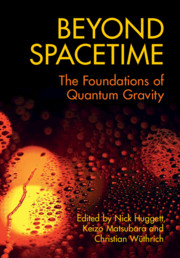Book contents
- Frontmatter
- Contents
- List of Contributors
- 1 Introduction
- Part I Spacetime Emergence
- 2 The Bronstein Hypercube of Quantum Gravity
- 3 Emergence of Time in Loop Quantum Gravity
- 4 Beyond Standard Inflationary Cosmology
- 5 What Black Holes Have Taught Us about Quantum Gravity
- Part II Time in Quantum Theories of Gravity
- Part III Issues of Interpretation
- Index
3 - Emergence of Time in Loop Quantum Gravity
from Part I - Spacetime Emergence
Published online by Cambridge University Press: 24 April 2020
- Frontmatter
- Contents
- List of Contributors
- 1 Introduction
- Part I Spacetime Emergence
- 2 The Bronstein Hypercube of Quantum Gravity
- 3 Emergence of Time in Loop Quantum Gravity
- 4 Beyond Standard Inflationary Cosmology
- 5 What Black Holes Have Taught Us about Quantum Gravity
- Part II Time in Quantum Theories of Gravity
- Part III Issues of Interpretation
- Index
Summary
Loop quantum gravity has formalized a robust scheme in resolving classical singularities in a variety of symmetry-reduced models of gravity. In this essay, we demonstrate that the same quantum correction that is crucial for singularity resolution is also responsible for the phenomenon of signature change in these models, whereby one effectively transitions from a `fuzzy' Euclidean space to a Lorentzian space-time in deep quantum regimes. As long as one uses a quantization scheme that respects covariance, holonomy corrections from loop quantum gravity generically leads to nonsingular signature change, thereby giving an emergent notion of time in the theory. Robustness of this mechanism is established by comparison across a large class of midisuperspace models and allowing for diverse quantization ambiguities. Conceptual and mathematical consequences of such an underlying quantum-deformed spacetime are briefly discussed.
Keywords
Information
- Type
- Chapter
- Information
- Beyond SpacetimeThe Foundations of Quantum Gravity, pp. 53 - 78Publisher: Cambridge University PressPrint publication year: 2020
Accessibility standard: Unknown
Why this information is here
This section outlines the accessibility features of this content - including support for screen readers, full keyboard navigation and high-contrast display options. This may not be relevant for you.Accessibility Information
- 2
- Cited by
